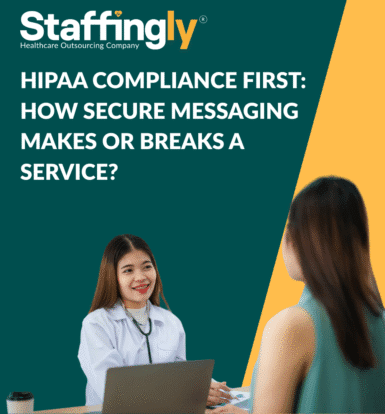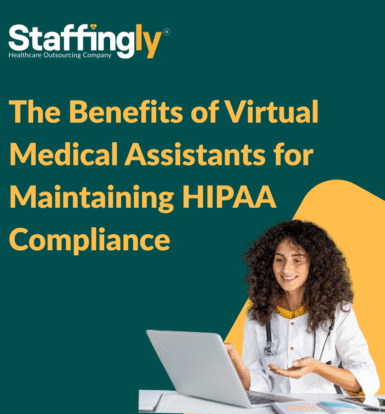On-Demand Outsourcing BPO Services for Healthcare Providers With 24/7 Coverage!
Save up to 70% on staffing costs!
Browse Specialty Staffing Services
Why Faxing Still Matters in U.S. Healthcare?
In an era where nearly every industry has embraced fully digital communication, healthcare in the United States continues to hold onto a seemingly outdated tool: the fax machine. While it may surprise some, faxing remains a cornerstone of medical communication, playing a vital role in safeguarding patient data and enabling the secure exchange of sensitive information. HIPAA Compliance and Data Security The Health Insurance Portability and Accountability Act (HIPAA) requires healthcare providers to ensure the confidentiality, integrity, and security of

Secure Data Encryption & Transmission Protocols in Healthcare
In US healthcare, protecting patient data isn’t just an IT responsibility — it’s a core operational and financial safeguard. One compliance slip can lead to HIPAA penalties of up to $50,000 per violation, with annual caps hitting $1.5 million — and that’s before the reputational damage. That’s why Secure Data Encryption & Transmission Protocols aren’t optional. They are the backbone of HIPAA compliance, cyberattack prevention, and uninterrupted revenue flow. Why US Healthcare Systems Can’t Afford Weak Data Protection Healthcare data

HIPAA Compliance First: How Secure Messaging Makes or Breaks A Service?
In healthcare, trust is built not only on the quality of care, but also on the protection of patient information. One of the most critical aspects of that protection is secure communication. For any healthcare service whether it’s a medical answering line, a telehealth platform, or a care coordination team HIPAA-compliant secure messaging isn’t optional; it’s the foundation of legal, ethical, and operational success. Why HIPAA Compliance Is Non-Negotiable? The Health Insurance Portability and Accountability Act (HIPAA) sets strict standards

Why Is Outsourcing the Smartest Way to Handle IT in Healthcare?
The healthcare industry is one of the fastest-growing sectors turning to business process outsourcing (BPO) to optimize operations and enhance patient care. By delegating critical but time-consuming tasks to specialized partners, healthcare providers like family clinic and can free up valuable resources time, focus, and finances—to concentrate on what matters most: delivering exceptional patient outcomes. In fact, the healthcare BPO market is projected to reach an impressive $312 billion by 2025, underscoring the growing demand for expert outsourcing solutions. If

The Benefits of Virtual Medical Assistants for Maintaining HIPAA Compliance
Virtual Medical Assistants (VMAs) are increasingly becoming an essential part of the healthcare industry. These AI-powered tools offer numerous benefits for healthcare providers, including assisting with daily tasks, improving patient care, and ensuring compliance with essential regulations such as the Health Insurance Portability and Accountability Act (HIPAA). HIPAA is designed to protect patient data, and failure to comply with its requirements can lead to severe penalties. Let’s explore how VMAs help healthcare providers stay compliant with HIPAA while boosting efficiency.

Why Alabama Healthcare Providers Need HIPAA-Compliant Virtual Medical Assistants?
In today’s fast-paced healthcare environment, HIPAA-compliant virtual medical assistants in Alabama are revolutionizing patient care and administrative efficiency. Not only do these professionals help streamline operations, but they also reduce costs and enhance patient experiences. Most importantly, they ensure strict compliance with HIPAA regulations, keeping patient data secure. For Alabama healthcare providers, adopting HIPAA-compliant virtual medical assistants isn’t just about convenience—it’s about protecting sensitive patient data and maintaining trust. This article explores why HIPAA compliance is crucial, the benefits of

How Can Outsourcing Help Maintain Compliance with HIPAA in Prior Authorization?
In the healthcare sector, navigating the intricate landscape of regulations, compliance, and patient confidentiality can be quite daunting. Prior Authorization (PA) plays a vital role in the healthcare process; however, it also introduces numerous compliance challenges. A primary concern for healthcare providers is maintaining adherence to the Health Insurance Portability and Accountability Act (HIPAA) while handling the influx of prior authorization requests. This article will examine how outsourcing services, such as those offered by Staffingly, Inc., can assist healthcare providers
 Book a Demo to Build Your Team Today!
Book a Demo to Build Your Team Today!


 Read Case Studies
Read Case Studies 



 Virtual Medical Assistants
Virtual Medical Assistants



